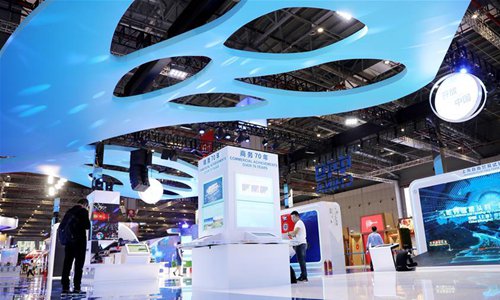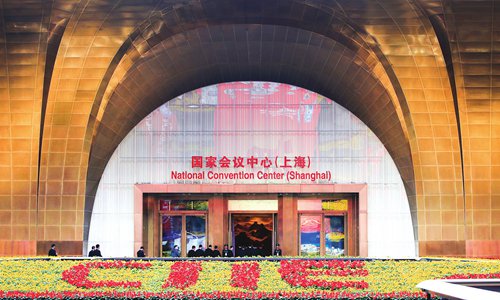HOME >> CHINA,SPECIAL-COVERAGE
China’s import fair to serve global interests
By Xie Jun in Shanghai and Li Qiaoyi, Yang Sheng in Beijing Source:Global Times Published: 2019/11/4 23:53:40 Last Updated: 2019/11/5 8:57:59
Tech-heavy expo sees China set global trade trend

The China Pavilion is seen at the second China International Import Expo (CIIE) in Shanghai on Sunday. The construction of country pavilions at the second CIIE has been completed. Photo: Xinhua
China's second import fair, coming at a time when the world is still mired in a rift over protectionism and unrest, is expected to serve the interests of all economies keen on capitalizing on opportunities abounding in the Chinese market, participating businesses and economists said on Monday.
Chinese President Xi Jinping hosted a banquet on Monday for guests attending the Second China International Import Expo (CIIE) in Shanghai, according to the Xinhua News Agency. This year's expo opens Tuesday and closes Sunday.
The expo, setting its focus on high-tech products and various services, will consolidate the nation's position as an open trade trendsetter and global growth engine, according to Chinese market watchers.
From the world's shortest insulin injection needle to a future driving cab which can detect and respond to driver mood changes, the expo is increasingly turning into a feast of cutting-edge technologies in all areas as exhibitors bring their latest-generation and concept products laden with high technologies to the country's largest import expo, A Global Times reporter noted in a tour of the expo venue on Monday.
Overseas exhibitors told the Global Times they brought their tech-heavy products to the expo looking for potential customers in China as the country increasingly demands for high-quality products in defiance of a global economic slowdown.
Amanda Lin, communications manager for the Greater China region of German semi-conductor manufacturer Infineon, said that the expo was a wonderful occasion for companies to teach the public about high-tech products like chips.
"From my observation, the integration of people's lives and high technologies has developed very fast in the recent 10 or 20 years in China. People in China are using those technologies even without awareness of it," she told the Global Times on Monday.
A look at the exhibits this year shows many companies brought an updated version of their exhibits from last year.
Automation system maker Omron, for example, brought along a fifth-generation table tennis robot. Equipped with Omron's latest sense and control technologies, the robot can detect and analyze player movements and give them directions, a function it didn't bring to the table in 2018.
Italian yacht manufacturer the Ferretti Group displayed a multifunctional high-speed patrol ship with almost all the parameters doubling those of the two leisure yachts it displayed last year.
"Last year many government officials and Chinese state-owned enterprises' representatives visited our exhibition hall," Chen Gang, chief representative of Ferretti Group, told the Global Times on Monday.
"We realized that they were potential buyers of our technology-laden public services and so we are tilting toward more high-level exhibits this year."

Photo taken on Oct. 31, 2019 shows an inner view of the Media Center of the second China International Import Expo (CIIE) at the National Exhibition and Convention Center in Shanghai, east China. The venue for the Supply-Demand Matchmaking Conference and Media Center of the CIIE have almost been completed and ready to supply service to reporters and participants of the expo. (Xinhua/Fang Zhe)
Chen said the ship "never left Europe" before but is coming to China for display as Chinese clients are looking for high-quality ships to help them deal with increasing sea operations such as offshore drilling, particularly in tough weather conditions and rough seas.
An uptick in Chinese household wealth and the nation's push to cut import tariffs have boosted imports of consumers goods, Lian Ping, chief economist of the Bank of Communications, told the Global Times on Monday.
Forecasting an upward trend in consumer goods imports, Lian stressed that the pivot toward high-tech products, as shown at this year's expo, points to the possibility of China overtaking the US as the world's top merchandise importer.
A thawing of China-US trade ties, indicated by the potential signing of the phase one of a trade deal between the two countries, suggests China might increase its tech-related imports, which account for a big part of the nation's entire imports, Lian said.
"The transcendence is expected in the next couple of years," he said.
In the first nine months, mechanical and electric products topped China's goods imports rankings with a 43.45 percent share, followed by high-tech products which took up 30.38 percent, according to a Global Times calculation based on Chinese customs data.
Services like finance and healthcare are also a focus at this year's event.
Singapore-based DBS Bank said in a statement sent to the Global Times on Monday that among its offerings at the expo are blockchain-based fintech solutions.
More than 3,000 companies from about 150 countries and regions, including more than 250 of the world's leading companies, have signed up for this year's expo, Xinhua reported on Saturday.
Last year over 2,800 companies from over 130 countries and regions confirmed participation prior to the opening of the first CIIE and a total 172 countries, regions and international organizations and over 3,600 enterprises eventually participated, according to Xinhua.
Noticeably, 192 US companies are set to attend, an increase of 18 percent from the previous year, according to Xinhua, citing Assistant Minister of Commerce Ren Hongbin at a news briefing in Beijing in late October.
The exhibition area for US businesses covers 47,500 square meters, the largest among all the participating countries at this year's fair.
French President Emmanuel Macron, Greek Prime Minister Kyriakos Mitsotakis, Jamaican Prime Minister Andrew Holness and Serbian Prime Minister Ana Brnabic are also expected to attend.

A view of the CIIE venue on Monday. Photo: Yang Hui/GT
Macron drawn
Macron will attend the opening ceremony, and according to the Chinese Embassy to France, 78 French enterprises applied for the expo while their exhibition zone fills more than 12,000 square meters. Sixty-nine French companies participated last year.
The French president's attendance at the expo showed that France has confidence in the Chinese economy, as well as the future of China-France cooperation, said Ding Yifan, a professor at Beijing Foreign Studies University.
"Through the expo, French companies can show their products to Chinese buyers directly, and this is a valuable opportunity for them to increase their exports to China," Ding said.
China would also use the chance to showcase "the charm of Chinese market" to foreign companies, he said.
Cui Hongjian, director of the Department for European Studies at the China Institute of International Studies told the Global Times Thursday that "China and France, as well as other EU members, always have divergences on several issues, and these divergences won't be solved in the short term, so the two sides should reasonably manage the divergence to avoid further misunderstanding."
Macron is the first major leader of a Western country to participate in the expo, Chinese experts noted, but in future they predicted more Western companies will come as they need a market like China.
Through the anti-poverty campaign and urbanization, the Chinese market will grow bigger and more attractive to Western firms which desperately want to sell their products, they all said.
Newspaper headline: Import fair to serve world
Posted in: DIPLOMACY,FOCUS